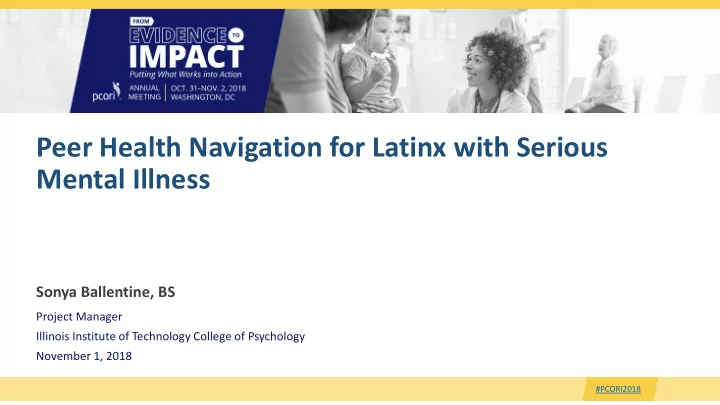

Peer Health Navigation for Latinx with Serious Mental Illness Sonya Ballentine, BS Project Manager Illinois Institute of Technology College of Psychology November 1, 2018 #PCORI2018
Sonya Ballentine • Has nothing to disclose. 2 • November 1, 2018
Objectives At the conclusion of this presentation, attendees should be able to • Objective 1: Communicate the findings of the study presented • Objective 2: Appreciate the importance of cultural factors in shaping and delivering peer navigation services 3 • November 1, 2018
Addressing an Evidence Gap • Patients with SMI experience greater co-morbidities • Latinx with SMI suffer these issues to a greater degree compared to Caucasians (Alegria, et al., 2011; Folsom et al., 2007) Health disparities are worsened by: Shortage of fluent Spanish speaking service providers • Lack of service providers familiar with Latino value systems (Hough et al., • 2002) Services often fail to consider immigration-related concerns (Keyes et al., • 2012) Unavailability of accessible services (De Jesus & Xiao, 2014) • Absence of insurance providers impacts service affordability (Gonzales & • Sommers, 2017) 4 • November 1, 2018
Peer Navigators • Have lived experience of mental illness • Serve the ethnic community from which they originate What they offer • Help navigate fragmented health system • Help others meet their personal needs • Offer instrumental support • Provide interpersonal support Evidence of effects • Improvement in health attitudes and self-management • Receipt of peer navigation led to more primary care linkage • Peer services related to fewer hospitalizations and inpatient days 5 • November 1, 2018
Hypotheses H1: Latinx with SMI assigned to a PN will show greater service use H2: Participants in intervention group will demonstrate improvements in quality of life, recovery, and personal empowerment 6 • November 1, 2018
Study Design • Randomized control trial • Population: Recruited 110 Latinx patients with SMI • The study took place in a Federally Qualified Health Center offering integrated primary care and behavioral services in Chicago • Intervention/Comparator: The study compared integrated care plus PNs and integrated care alone • Outcomes: Recovery; personal empowerment; quality of life 7 • November 1, 2018
PNP Curriculum Adaptation • Qualitative findings used to adapt curriculum 8 • November 1, 2018
PNP Curriculum Adaptation • CBPR Team: Latinx with lived experience, researchers and service providers 9 • November 1, 2018
Method Recruitment: • Participants recruited from Chicagoland area Screening: • Ongoing significant concerns about general medical health • Quality of life or life goals impacted by general medical health • 161 participants screened, 51 excluded 10 • November 1, 2018
Method Conditions: • PNP (integrated care with a PN) • Treatment-as-usual (integrated care without a PN) Peer Navigator Hiring: • 4 Latinos in recovery of SMI were hired full-time • PNs were asked about current beliefs/skills important to PN services 11 • November 1, 2018
Method PN and Participant Engagement: • PNs used manualized skills/concepts during meetings with service recipients • GOAL: Analyze health concerns and actions to achieve successful transition • Participant contact at least once a week • Meetings up to five times a week depending on participant’s needs 12 • November 1, 2018
Patients • Patients were 45 years old (average) • Top 3 self-reported diagnoses: • 68% (N=75) major depression • 21% (N=23) anxiety disorder • 7% (N=8) bipolar depression Groups Differed by: • Age (PNP older) • Place of birth (more PNP participants born outside continental United States) 13 • November 1, 2018
Results • PNP group had significantly greater achieved appointments for service recipients in first 4 months than the control group. • No consistent pattern for monthly achievement • Sig. improvement in recovery, empowerment, and quality of life were found for PNP service recipients throughout the study. 14 • November 1, 2018
PEER NAVIGATOR STRENGTHS PEER NAVIGATOR CHALLENGES Emotional support that Need for greater supervisory enhanced self-esteem supports and availability Ability to navigate community Better communication about resources changes in agency procedures Application of unique problem- Limited resources for solving techniques undocumented clients Ability to provide safe spaces and Additional training in grief, trustworthy environment substance use and safety 15 • November 1, 2018
Future Research • Self-reported diagnoses: need for structured interview • Focus on Latinx-specific characteristics • Focus on subpopulation previously identified in focus groups • Comorbidity with substance use disorder • Primary language (English vs. Spanish) • Community of origin (e.g., Mexican vs. South American) • Immigration status • Peer-led intervention vs peers w/o lived experience • Health improvement maintenance post-program 16 • November 1, 2018
Learn More • www.pcori.org • info@pcori.org • #PCORI2018 • www.chicagohealthdisparities.org 17 • November 1, 2018
Thank You! Sonya Ballentine Project Manager Illinois Institute of Technology College of Psychology November 1, 2018 18 • November 1, 2018
Discussion 19 • November 1, 2018
Questions? 20 • November 1, 2018
Recommend
More recommend